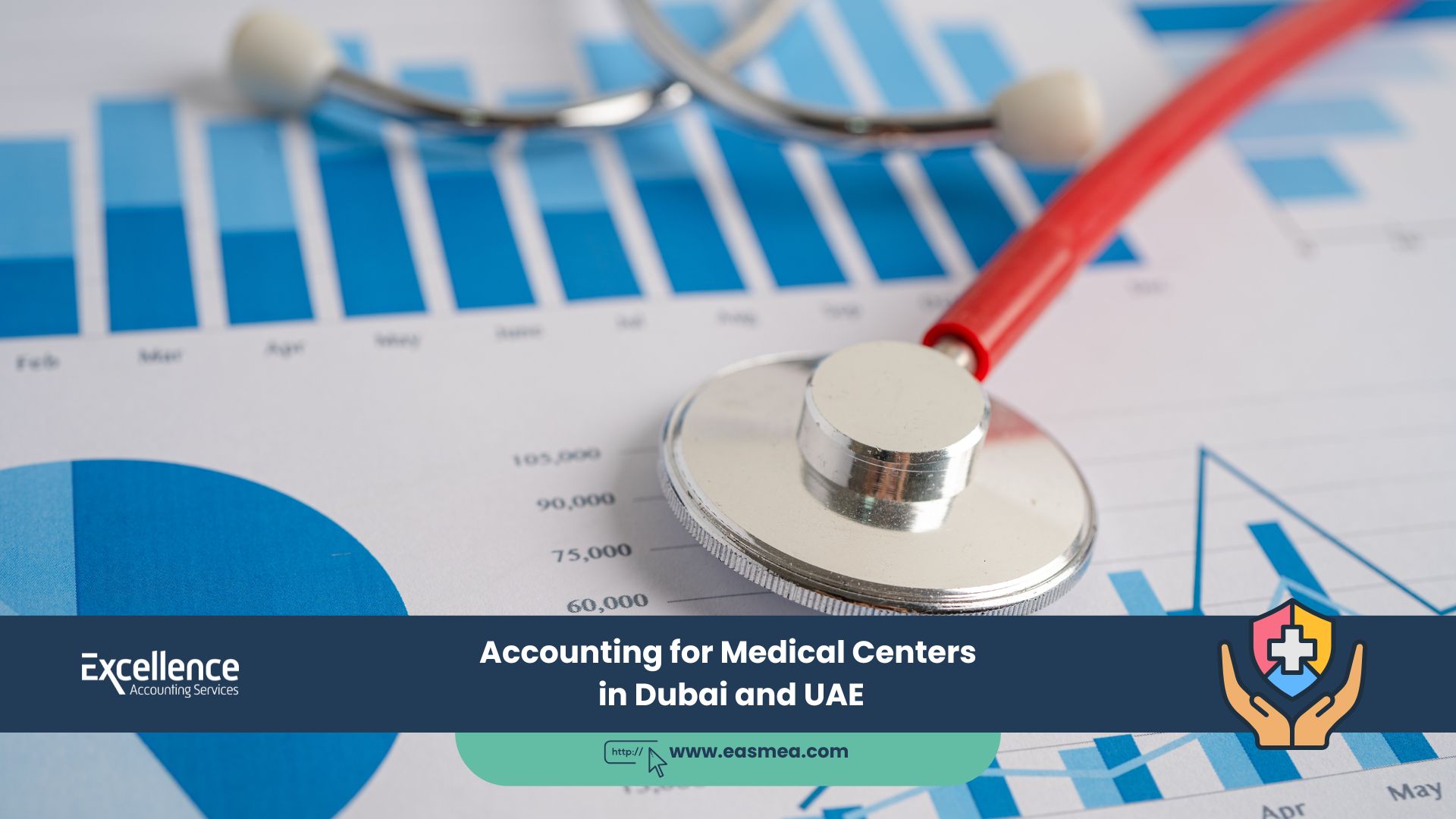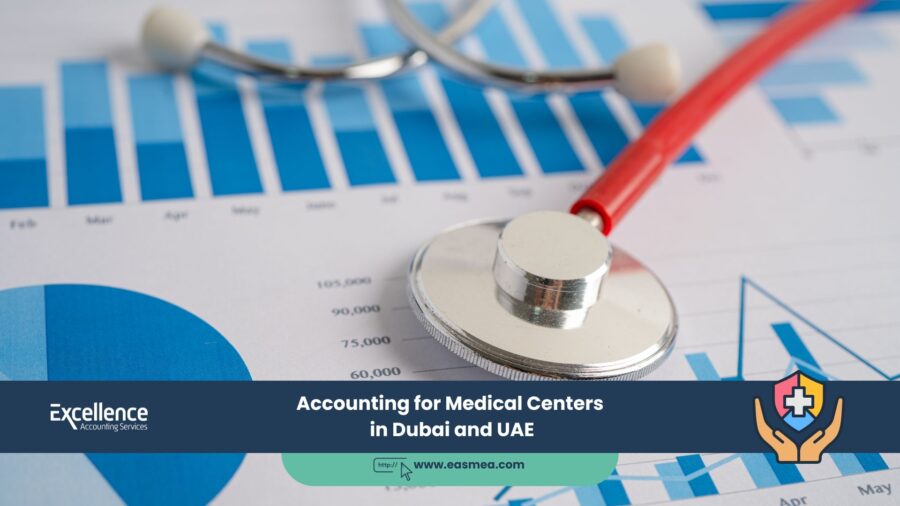The healthcare sector in Dubai and the UAE is dynamic and rapidly evolving, demanding robust financial management and meticulous accounting practices. For medical centers, navigating the complexities of financial regulations, VAT compliance, and revenue cycle management is crucial for sustained success.
- Foundational Accounting Principles for Medical Centers in Dubai
- Navigating VAT and Tax Compliance for Medical Centers in UAE
- Optimizing Financial Management for Medical Centers
- Leveraging Technology for Financial Efficiency
- Ensuring Financial Compliance and Auditing in the UAE
- What Excellence Accounting Services Can Offer
- Frequently Asked Questions (FAQ)
- Conclusion
- Optimize Your Medical Clinic's Financial Health Today!
This blog post delves into the intricacies of accounting for medical centers in Dubai and accounting for medical clinics in UAE, providing comprehensive insights into the financial aspects that healthcare providers must master. We will explore the specific accounting for medical centers challenges faced by medical clinics, the best practices for financial management, and how to ensure compliance with local regulations.
Foundational Accounting Principles for Medical Centers in Dubai
Specific Accounting Challenges for Medical Clinics in Dubai
Medical clinics in Dubai face unique accounting for medical centers challenges due to the nature of their services and the regulatory environment. One significant challenge is managing the diverse revenue streams, which include insurance claims, patient payments, and government reimbursements.
Medical billing is a complex process, requiring accurate coding and documentation to ensure timely payments. Additionally, clinics must navigate the complexities of VAT for medical clinics UAE, as certain medical services are exempt or zero-rated. Another challenge is managing the high operational costs, including medical equipment, staff salaries, and facility maintenance.
Moreover, regulatory compliance is paramount. Healthcare providers must adhere to the UAE’s accounting standards and specific healthcare regulations. This includes maintaining accurate financial records, preparing timely financial statements, and undergoing regular audits.
Financial reporting for medical clinics must be transparent and accurate to ensure compliance and build trust with stakeholders. Furthermore, managing cash flow can be challenging due to delayed insurance payments and fluctuating patient volumes. Therefore, robust cash flow management strategies are essential for the financial stability of medical clinics.

Importance of Accurate Bookkeeping for Medical Clinics
Accurate bookkeeping is the backbone of effective financial management for medical clinics. It ensures that all financial transactions are recorded correctly, allowing for precise financial reporting and analysis.
Medical clinic bookkeeping in Dubai requires meticulous attention to detail, as even minor errors can lead to significant financial discrepancies. Accurate bookkeeping facilitates the preparation of financial statements, including the profit and loss statement and balance sheet, which are essential for monitoring the clinic’s financial performance.
Moreover, accurate bookkeeping supports effective AR (Accounts Receivable) management and AP (Accounts Payable) management. By tracking outstanding invoices and payments, clinics can optimize their cash flow and minimize financial risks. It also aids in budgeting and financial planning, allowing clinics to make informed decisions about investments and operational expenses.
Furthermore, accurate bookkeeping is crucial for clinic tax compliance UAE, ensuring that clinics meet their tax obligations and avoid penalties. In essence, it is the foundation for all financial decisions.
| Task | Description | Importance |
|---|---|---|
| Revenue Cycle Management | Managing patient billing, insurance claims, and payment collections. | Ensures timely cash flow and minimizes revenue loss. |
| VAT Compliance | Understanding and applying VAT regulations to medical services, including exemptions and zero-rated supplies. | Avoids penalties and ensures compliance with UAE tax laws. |
| Financial Reporting | Preparing accurate financial statements, including profit and loss statements and balance sheets. | Provides insights into financial performance and supports informed decision-making. |
| Payroll Management | Processing salaries, benefits, and deductions for healthcare staff. | Ensures employee satisfaction and compliance with labor laws. |
| Auditing | Conducting regular internal and external audits to ensure financial accuracy and compliance. | Identifies potential risks and ensures transparency and accountability. |
Navigating VAT and Tax Compliance for Medical Centers in UAE
How to Manage VAT for Healthcare Services in the UAE?
Managing VAT for healthcare services in the UAE requires a thorough understanding of the regulations and their application to medical services. Certain medical services are exempt from VAT, while others are subject to a standard rate or zero-rated.
VAT consultancy for medical centers in Dubai is crucial for navigating these complexities. Medical centers must accurately classify their services and maintain detailed records to support their VAT filings. VAT registration for medical centers in Dubai is the first step, followed by regular VAT returns and payments.
To effectively manage VAT, medical centers should implement robust accounting systems and processes. This includes accurately recording all transactions, segregating taxable and exempt supplies, and maintaining proper documentation. Healthcare regulations often intertwine with tax regulations, therefore, staying updated with changes is vital. Furthermore, training staff on VAT compliance and seeking expert advice can help avoid costly errors and penalties.
Corporate Tax for Medical Clinics in Dubai and UAE
Corporate tax regulations in the UAE are evolving, and medical clinics must stay informed to ensure compliance. The introduction of corporate tax has significant implications for healthcare providers, requiring them to reassess their financial strategies. Understanding taxable income, allowable deductions, and tax filing requirements is essential. Clinic tax compliance UAE involves meticulous record-keeping and accurate financial reporting.
Effective corporate tax management includes strategic financial planning to optimize tax liabilities. Clinics should consider the tax implications of various business decisions, such as investments in medical equipment and expansion plans. What are the tax implications for medical equipment purchases in Dubai? The answer is that depreciation methods and potential tax credits must be considered. Moreover, engaging with tax consultants can provide valuable insights and guidance on navigating the corporate tax landscape.
“Effective tax management is not just about compliance; it’s about strategic financial planning to ensure long-term sustainability.”
Optimizing Financial Management for Medical Centers
How to Improve Revenue Cycle Management for a Healthcare Practice?
Revenue cycle management (RCM) is critical for the financial health of medical practices. Efficient RCM ensures timely and accurate billing, reduces revenue leakage, and improves cash flow. To improve RCM, medical clinics should streamline their billing processes, automate insurance claim submissions, and implement robust patient payment systems. Revenue cycle management medical clinics must be proactive and data-driven.
Implementing electronic health records (EHR) and practice management systems can significantly enhance RCM. These systems automate many administrative tasks, reduce errors, and improve communication between departments. Additionally, regular training for staff on coding, billing, and insurance procedures is essential.
AR (Accounts Receivable) management should be a priority, with regular follow-ups on outstanding payments and proactive measures to minimize bad debt.
Best Practices for Payroll Management for Medical Staff in Dubai
Payroll management for medical staff in Dubai involves handling salaries, benefits, and deductions while complying with UAE labor laws. Accurate and timely payroll processing is crucial for employee satisfaction and retention. Payroll for healthcare staff Dubai requires meticulous attention to detail and adherence to regulatory requirements. Implementing payroll software can automate many tasks and reduce errors.
Best practices for payroll management include maintaining accurate employee records, calculating overtime and allowances correctly, and ensuring timely payment of salaries. Clinics should also stay updated on changes to labor laws and regulations to avoid penalties. Financial management medical centers UAE should include payroll as part of the total financial strategy. Furthermore, offering competitive salaries and benefits can help attract and retain skilled medical professionals.
| Element | Description | Benefit |
|---|---|---|
| Patient Registration | Accurate collection of patient information, including insurance details. | Reduces billing errors and ensures accurate claim submissions. |
| Medical Coding | Assigning appropriate codes to medical diagnoses and procedures. | Ensures accurate billing and compliance with insurance requirements. |
| Claim Submission | Submitting claims to insurance companies promptly and accurately. | Accelerates payment processing and improves cash flow. |
| Payment Posting | Recording payments from insurance companies and patients accurately. | Ensures accurate financial records and facilitates reconciliation. |
| AR Management | Tracking and managing outstanding invoices and payments. | Minimizes bad debt and improves cash flow. |
Leveraging Technology for Financial Efficiency
Best Accounting Software for Medical Centers in Dubai?
Choosing the right accounting software is crucial for streamlining financial processes and improving efficiency. Accounting software for medical centers should be tailored to the specific needs of healthcare providers. Features such as medical billing, insurance claim tracking, and patient payment integration are essential. Zoho Books is a popular choice due to its user-friendly interface, robust features, and affordability.
Implementing Zoho Books or similar software can automate many accounting tasks, reduce errors, and improve financial reporting. Zoho Books setup for medical clinics should be done by professionals to ensure proper configuration and integration with other systems. Furthermore, using cloud-based accounting software allows for real-time access to financial data, facilitating informed decision-making.
How to Forecast Financial Performance for a Medical Clinic in Dubai?
Forecasting financial performance is essential for strategic planning and decision-making. It allows medical clinics to anticipate future revenue, expenses, and cash flow, enabling them to make informed decisions about investments and operational expenses. Financial planning should include forecasting as a key component.
To forecast financial performance, clinics should analyze historical data, identify trends, and consider future projections. This includes estimating patient volumes, revenue from different services, and operating expenses.
Budgeting is also a key component of financial forecasting. Regular financial reports and analysis should be reviewed, and adjustments should be made as needed. Furthermore, utilizing financial forecasting tools and software can enhance accuracy and efficiency.
Ensuring Financial Compliance and Auditing in the UAE
What are the Auditing Requirements for Medical Centers in the UAE?
Auditing is essential for ensuring financial accuracy and compliance with regulatory requirements. Medical centers in the UAE must undergo regular audits to verify their financial statements and internal controls. Auditing medical centers Dubai involves reviewing financial records, assessing risk management practices, and ensuring compliance with accounting standards.
Audits can be internal or external. Internal audits are conducted by the clinic’s staff, while external audits are performed by independent auditors. The purpose of an audit is to provide assurance that the financial statements are free from material misstatements and that the clinic’s internal controls are effective. Healthcare regulations mandate these audits. Moreover, audits help identify potential risks and areas for improvement in financial management.
How to Ensure Financial Compliance for a New Medical Clinic in UAE?
Ensuring financial compliance for a new medical clinic in the UAE requires careful planning and implementation of robust financial systems. This includes registering with the relevant authorities, obtaining necessary licenses, and implementing accounting software. Business setup for medical center should consider financial compliance from the beginning.
New clinics should develop a comprehensive financial policy and procedure manual, outlining accounting for medical centers practice, internal controls, and reporting requirements. They should also engage with experienced accountants and consultants to ensure compliance with local regulations. Furthermore, regular training for staff on accounting accounting for medical centers procedure and regulatory requirements is essential.
| Step | Description | Importance |
|---|---|---|
| Register with Authorities | Register the medical clinic with the relevant authorities, such as the Department of Economic Development and the Ministry of Health. | Ensures legal operation and compliance with government regulations. |
| Obtain Necessary Licenses | Obtain all required licenses and permits, including medical licenses and business licenses. | Ensures compliance with industry-specific regulations and avoids legal issues. |
| Implement Accounting Software | Implement robust accounting software, such as Zoho Books, to manage financial transactions and generate accurate financial reports. | Streamlines financial processes and improves accuracy. |
| Develop Financial Policies | Develop comprehensive financial policies and procedures manuals, outlining accounting accounting for medical centers practice, internal controls, and reporting requirements. | Provides clear guidelines for financial management and ensures consistency. |
| Engage with Experts | Engage with experienced accountants and consultants to ensure compliance with local regulations and best practices. | Provides expert guidance and support in navigating complex financial regulations. |
| Regular Staff Training | Conduct regular training for staff on accounting procedures and regulatory requirements. | Ensures that staff are knowledgeable and competent in handling financial matters. |
“Financial compliance is not a one-time effort; it requires continuous monitoring and adaptation to evolving regulations.”
What Excellence Accounting Services Can Offer
Excellence Accounting Services specializes in providing comprehensive accounting solutions tailored to the unique needs of medical centers in Dubai and the UAE. Our team of experienced professionals understands the intricacies of healthcare accounting and can help you navigate the complexities of financial management, VAT compliance, and tax regulations. We offer a range of services, including bookkeeping, financial reporting, VAT consultancy, and payroll management.
Our services are designed to streamline your financial processes, improve efficiency, and ensure compliance with local regulations. We utilize cutting-edge accounting software, such as Zoho Books, to provide accurate and timely financial information. We also offer customized solutions to meet the specific needs of your medical clinic. With Excellence Accounting Services, you can focus on providing quality healthcare while we take care of your financial management.
Specialized Healthcare Accountants in Dubai
Our team of specialized healthcare accountants in Dubai possesses in-depth knowledge of the healthcare industry and its financial requirements. We understand the nuances of medical billing, insurance claims, and revenue cycle management. Our accountants are proficient in handling VAT for medical clinics in the UAE and can provide expert guidance on tax compliance.
We provide personalized services to ensure that your medical clinic’s financial needs are met. Our accountants are committed to delivering accurate and reliable financial information, enabling you to make informed decisions. We stay updated on the latest regulatory changes and best practices to ensure that your clinic remains compliant and financially sound.
Financial Risk Management in Medical Practices
Managing financial risks is crucial for the sustainability of medical practices. We help medical clinics identify and mitigate potential financial risks, such as revenue leakage, cash flow issues, and regulatory non-compliance. Our risk management strategies are tailored to the specific needs of each clinic, ensuring that they are protected from financial uncertainties.
We conduct thorough financial assessments to identify potential risks and develop mitigation plans. Our services include financial forecasting, budgeting, and internal control assessments. We also provide guidance on insurance coverage and risk management best practices. With our expertise, medical clinics can minimize financial risks and achieve long-term financial stability.
Frequently Asked Questions (FAQ)
Conclusion
Accounting for medical centers in Dubai and the UAE requires a deep understanding of the healthcare sector’s unique financial and regulatory landscape. From managing revenue cycles and ensuring VAT compliance to optimizing cash flow and leveraging technology, medical clinics must adopt robust financial practices to ensure sustainable growth.
By implementing effective accounting strategies, medical centers can enhance their financial health, build trust with stakeholders, and focus on delivering high-quality healthcare services.




